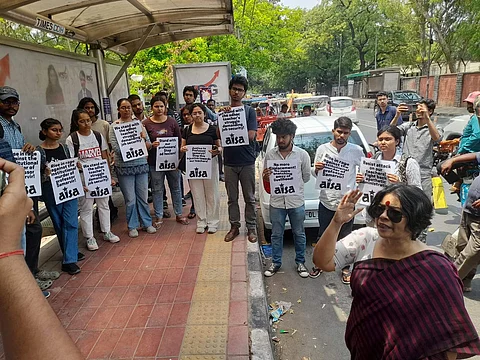

Students and professors from various colleges in Delhi University (DU) have labelled the recent alleged suicide by a former ad-hoc professor to be an ‘institutional murder’.
On Wednesday, April 26, Samarvir, a 33-year-old former ad-hoc lecturer at Delhi University's Hindu College allegedly committed suicide. Reports stated that Sarmarvir was undergoing depression after he was displaced from Hindu College a few months ago.
When the news of the lecturer’s death came out, the All India Students Association (AISA) called for a protest at Hindu College demanding accountability from the administration. Students and AISA activists gathered outside Hindu College on Thursday, April 27. They were also joined by DU professors Abha Dev Habib and Nandita Narain.
“We will be campaigning, protesting, and starting a movement to support our professors and to seek justice against this institutional murder,” said Anjali, Secretary, AISA DU.
Larger issue:
There is an ongoing issue regarding the regularisation of ad-hoc professors at Delhi University. It has been a long-withstanding demand by the teachers that the ad-hoc professors, some of whom have been working at the university for decades without permanent status, be absorbed by the university.
The university recently started a screening process and interviews for hiring these professors on a regular basis.
However, many professors who could not make a cut for the interview were displaced in the last two months, despite years of experience as a lecturer at DU. Nandita Narain, associate professor at St. Stephen’s College, DU and former president of the Delhi University Teachers’ Association (DUTA), claimed that in some of the departments, 90 per cent of the ad hoc faculty have lost their jobs.
“In the last 100 years of this institution, there has not been a bigger crisis than this. Since the interview process started, there has been a massive displacement of ad-hoc teachers. A huge percentage of faculty at DU were ad hoc and through no fault of their own, there had not been interviews all these years. These are some of the best teachers who have been working for 10-20 years, who have so much experience and are student-favourite as well,” added Narain.
The professor added that there is around a 75 per cent displacement rate in the ongoing interview process at Delhi University. Narain also highlighted that as per the new university guidelines, a 100 per cent weightage for hiring in permanent positions has been given to the interview, which is arbitrary and unfair.
Dr Maya John, Member of Academic Council (2023-25), University of Delhi, said “It is a fact that a sizable number of long-serving ad-hoc teachers, who otherwise fill all the eligibility criteria for teaching posts advertised by DU colleges, and have worked very hard for their institutions, are being displaced in the recent interviews. With permanent appointments being made through a so-called ‘open’ recruitment process that often amounts to just a five minutes interaction with the candidate and has facilitated massive displacement, there expectedly looms in many ad-hoc teachers.”
Dr Maya further added that non-merit factors like nepotism, favouritism, adherence, liaising, influencing, and obeisance that are at play in the interview process.
The teachers have demanded an immediate general body meeting (GBM) of the DUTA to discuss the woes of ad-hoc teachers and to effectively fight for the rights of ad-hoc faculty.
